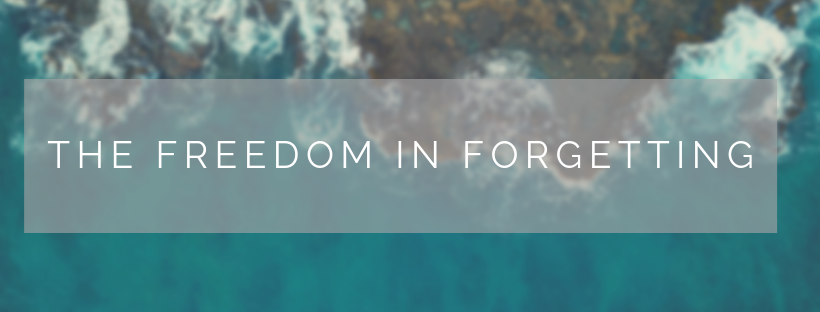The Freedom in Forgetting

“Don’t forget your lunch,” says mom as you run out the door.
“Remember your homework tomorrow!” exclaims your teacher as the bell rings.
“Did you remember to floss?” asks the dentist.
Memory can either save us from embarrassment or evade us at the worst possible time. Oftentimes we hope for the former while, yet again, experiencing the latter. We invent and reinvent basic tools such as calendars, reminders, and to-do lists to do our remembering for us, and then we forget to check them, and soon enough give up using them altogether. If we are honest, we often don’t want to take the time to make sure we remember what we need to. “I’m too busy,” we claim, or “I still get things done,” we declare.
But, there are scenarios that we all go through where, seemingly all of sudden, as if someone simply flipped a switch in our minds, we can remember things easily.
Perfectly.
Without a doubt.
In fact, we remember them so well and so regularly that we can begin to create things in our minds that didn’t happen, yet we convince ourselves that because they could happen, they might as well have actually happened. And if we are not careful, these types of memories will begin to clog our ability to remember other things that are essential to our daily lives.
What scenarios am I referring to?
When others hurt us.
When others wrong us.
When others sin against us, even, we have to admit, when it’s unintentional.
When these things happen, it’s like our whole mind fixes its attention on the evil we have experienced to the exclusion of anything else going on in our lives. We suddenly don’t have any issue remembering what he said, or what she did. It’s like we want to remember what has been done to us, as if doing so will actually make us feel better or in some more concrete way, make us actually be better off in the end. If we are not careful, this temptation can hit us like a tidal wave, and before we know it, we are flooded with anger, resentment, and bitterness. Then, every time we see or even think about the person(s) who wronged us, we imagine their sin(s) on a record, a record for which we want to condemn them, even if just in our own minds.
Why is it so much easier to remember being sinned against than to remember almost anything else?
Is it possible, or even desirable, to think and act in any other way, especially when we relate so well with people who are passionately angry and it seems like they get some revenge?
What does God’s Word have to say about this?
Paul wrote to the Corinthians that “love…keeps no record of wrongs” (1 Corinthians 13:5). This description of love falls right in the middle of a whole chapter describing what love is actually like. If we’re honest, most of the descriptions we read in 1 Corinthians 13 make us cringe because we see how we are often so different from how God wants us to love.
Paul, inspired by God’s Holy Spirit, challenged his readers to not keep a record of wrongs done to them at least in part because humanity is so prone to doing so! And, he knew that this way of thinking and living is exactly the opposite of how God treats us as believers! The terms in this phrase in 1 Corinthians 13:5 are the same terms that Paul uses throughout Romans and Galatians to describe how God treats our sins against Him because of Jesus’ death on the cross. In other words, for a believer, God does not hold a record of our wrongs against us in a way that leaves us condemned. No, it has been nailed to the cross (Colossians 2:14)! Praise God, as believers, we are forgiven of our sin! And when God forgives us, he does not forget our sin in the sense of being unable to remember it anymore. Rather, He forsakes our sin, meaning that He chooses to not hold it against us anymore. So, because God has chosen to forgive and forsake our sin, He commands and enables us to do the same for others.
In the instant access, 24/7, social media-saturated world that we live in, the ability and opportunity to sin against others or be sinned against seems to be growing. In a sense, it has never been easier to harm someone physically, mentally, emotionally, or socially. Our society in general, and our schools in particular, are dominated by this type of behavior, and I am sure yours has experienced it to some degree.
But what if we lived in such a way that demonstrated the forgiveness, mercy, grace, and in short, the love of Jesus to others, including and especially when they sin against us?
What if we swallowed our pride, said (and meant!) the words “I forgive you,” and then kept treating people as if they had value to God and to us?
What if we actually remembered the fact that God said in Romans 12:19, “vengeance is mine, I will repay,” not because we desire God to avenge us but rather because we trust that His way of justly running the universe is way better than ours?
So often, we hear and think of “making a difference” in a way that does help people, but also helps us build our own reputations. What if the difference God wants you to make, and enables you to make, is overcoming evil with good (Romans 12:21)? And what if you won’t see the magnitude of that difference until you see Jesus one day face-to-face?
Is that enough?
By God’s grace, let’s forsake our record of wrongs against others, because God nailed our record of wrongs against Him to the cross, and He will never hold it against us again!
